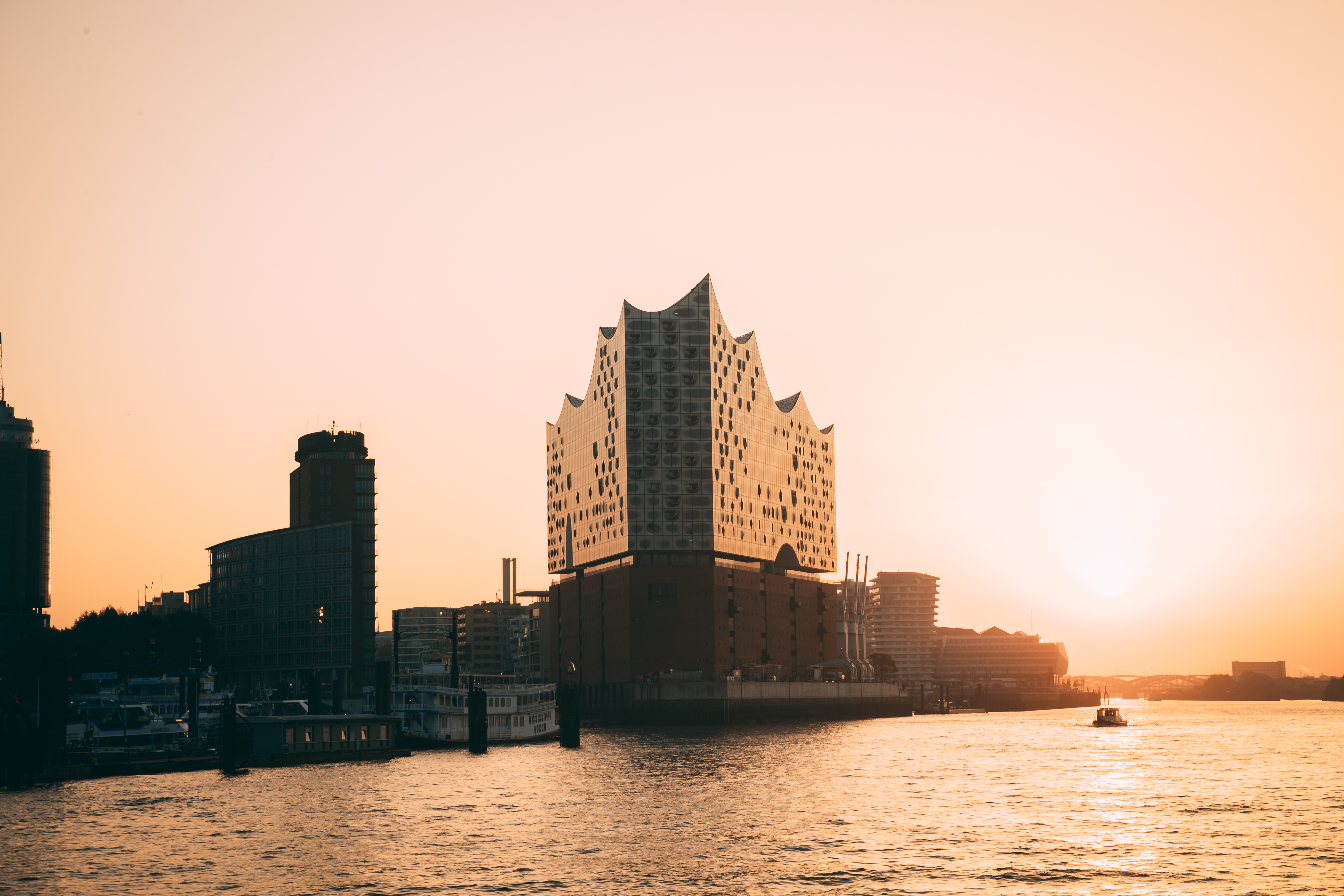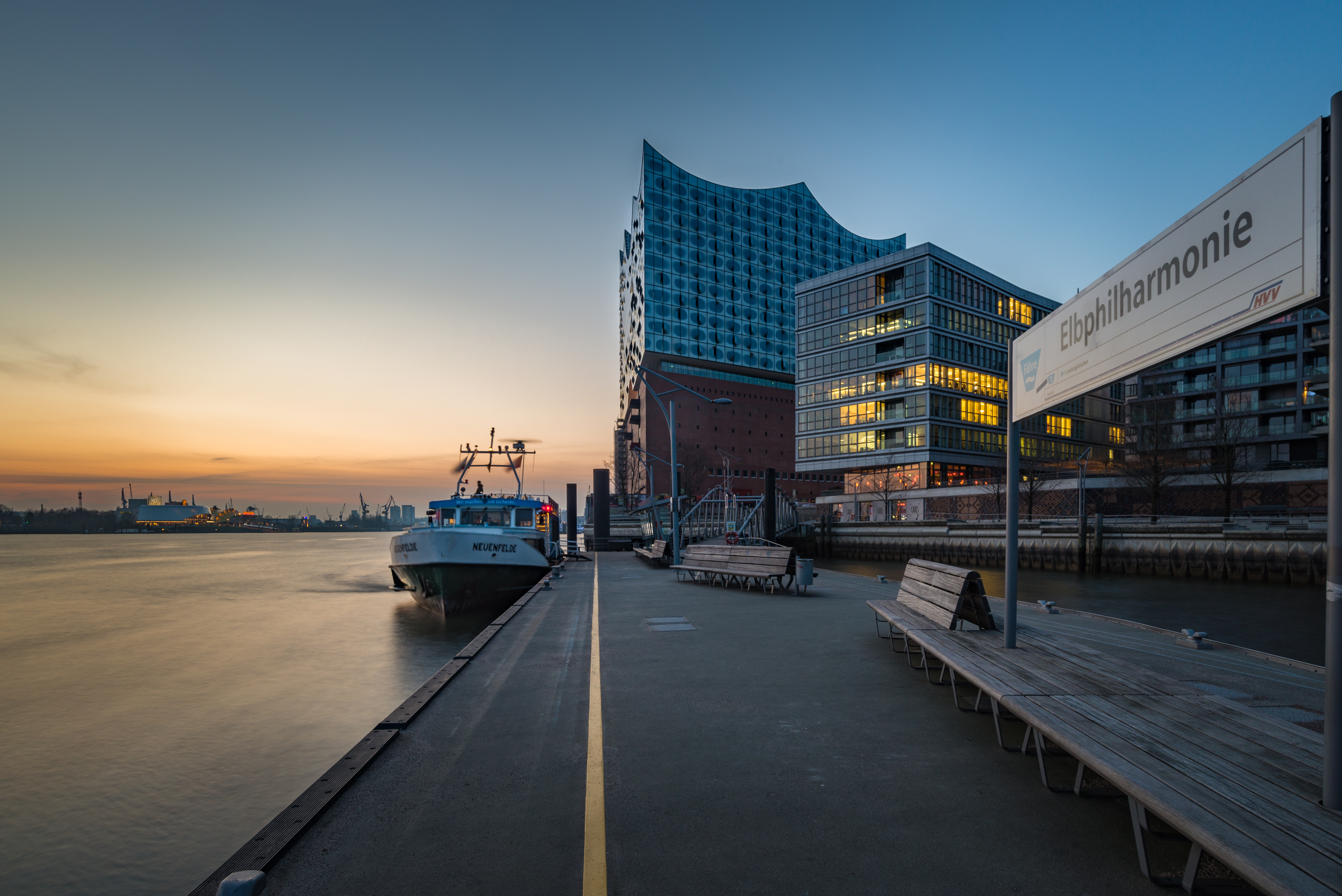Elbphilharmonie: Factsheet

Elbphilharmonie Hamburg in figures
- More than 14.5 million visitors to the Plaza viewing platform (04/11/2016–11/01/2022) and around 3.3 million concert guests (11/01/2017–11/01/2022) to date
- Over 2,900 concerts have been performed in the Elbphilharmonie to date, and 1,600 of these have taken place in the Grand Hall.
- More than 3,400 educational events, with almost 200,000 visitors/participants as well as 9,782 guided tours have taken place since the opening of the Elbphilharmonie.
- The largest concert ensemble comprised 420 individuals (Terry Riley, “In C”, 13 May 2017). The longest concert lasted 9 hours: Kaikhosru Shapurji Sorabji, Organ Symphony No. 2 (Kevin Bowyer, organ) on 15 Sep 2019. The shortest concert lasted 30 minutes: the “Pepe & Speedy” twinkle concert on 4 Sep 2020 (as well as other dates).
- The most frequently played pieces of music:
- Ludwig van Beethoven, Symphony No. 7 in A major op. 92 (27 performances)
- Antonín Dvořák, Symphony No. 9 in E minor, op. 95 “From the New World” (26 performances)
- Johannes Brahms, Symphony No. 1 in C minor op. 68 (20 performances)
- The most frequently performed composers were:
o Ludwig van Beethoven: 486x
o Wolfgang Amadeus Mozart: 390x
o Johann Sebastian Bach: 350x
- Between 11 January 2021 and early November 2021, the gastronomic establishments of the Elbphilharmonie served 200,785 pretzels, 25,251 glasses of Crémant, 255,215 one-litre bottles of white Burgundy wine, 23,795 glasses of Aperol Spritz and 7,443 glasses of Champagne Ruinart.
Christoph Lieben-Seutter, General and Artistic Director of the Elbphilharmonie
“I am absolutely delighted that, after a long period of uncertainty, the 5th anniversary concerts can actually take place with only a few cutbacks and in front of a full house. For me and my team, the week ahead will offer the opportunity to reflect on the exciting times we have shared since the opening and to celebrate with our many companions, friends and supporters the fact that the Elbphilharmonie has more than fulfilled the high expectations that were placed on it.”
5 years of the Elbphilharmonie and its impact on Hamburg
The Elbphilharmonie as a touristic hotspot and “cultural tourism amplifier”
(Survey to identify Hamburg’s guest potential in the area of cultural tourism, October 2019, excerpts).
- Overnight stays in Hamburg have increased by more than 15% between January 2017 and late 2019. Overnight stays by international guests have increased by 15.8%. This marked increase is partially owing to the Elbphilharmonie's strong appeal.
- While Hamburg is primarily associated with its port (as stated by 25% of tourists surveyed), this is now directly followed by the Elbphilharmonie (23% of respondents).
- For 22% of German overnight tourists who visit Hamburg for the first time, the travel occasion is an Elbphilharmonie event or a visit to the Plaza viewing platform.
- International examples: 17% of Danish first-time guests come to Hamburg to attend a concert in the Elbphilharmonie, and for 16% the travel occasion is a visit to the Plaza. As regards tourists from Switzerland, 18% of overnight guests come to Hamburg for the first time to attend a concert in the Elbphilharmonie (repeat attendees: 21%). For one quarter of Swiss guests, the travel occasion is a visit to the Plaza.
- 75% of guests who were in or at the Elbphilharmonie also attended an opera production, 73% attended a drama/theatre play, 82% dance and ballet, and 80% visited exhibitions and galleries. 58% of Elbphilharmonie visitors also visited museums during their stay in Hamburg.
- At the Hamburger Kunsthalle, for example, the city's largest art museum, the share of visitors from abroad increased after the opening of the Elbphilharmonie from 11% in 2016 to 21% in 2019.
Michael Otremba, Managing Director of Hamburg Marketing and Tourism Board:
(1) “In terms of Hamburg’s external image, the Elbphilharmonie has become the visually powerful landmark we had hoped for. It is also an iconic place with high recognition value for Hamburg and one of the must-see locations in Germany”.
(2) “The Elbphilharmonie has become an indispensable part of Hamburg’s external image. It keeps generating highly visible communication occasions and continues to be very attractive to the public. It is a source of great inspiration beyond the city limits, and we use this in marketing to the advantage of the entire city.”
The cultural city of Hamburg
Hamburg is home to over 300 cultural institutions, and some of the highlighs are listed below.
- Hamburg has around 60 museums and exhibition houses as well as numerous galleries. The unique Kunstmeile Hamburg – an association of five renowned exhibition houses/art museums in the city centre that can be visited with one ticket (the “Kunstmeile Pass”) – includes the Bucerius Kunst Forum (with new premises since 2019), the Deichtorhallen, the Hamburger Kunsthalle, the Kunstverein, and Museum for Arts and Crafts Hamburg (MK&G).
- With as many as 45 theatres in Hamburg, theatre lovers are spoilt for choice. Since December 2021, the Mehr Theater has been the only theatre to present a spectacular German language production of “Harry Potter and the Enchanted Child”. The Deutsches Schauspielhaus is Germany's largest theatre of the spoken word, and the Thalia Theater is frequently ranked among Germany’s best German-language theatres. Time and again, Hamburg’s renowned theatres ensure top-class performances and premieres.
- As a city of music, Hamburg can draw on a centuries-old tradition of classical music:
- In 1678, Europe’s first public opera house opened on Gänsemarkt. Today, the Hamburg State Opera with general music director and conductor Kent Nagano, is one of the world's leading opera houses.
- Famous composers such as Johannes Brahms, Carl Philipp Emanuel Bach, Georg Philipp Telemann, Johann Adolf Hasse, C. P. E. Bach, Fanny and Felix Mendelssohn-Bartholdy and Gustav Mahler were born in Hamburg or lived here. In the Composers’ Quarter in the Neustadt, visitors can gain insights into the lives and works of these great artists.
- Ever since its opening in 2017, the Elbphilharmonie Hamburg has been one of world’s leading concert halls in terms of both acoustics and programming. With the NDR Elbphilharmonie Orchestra under the baton of conductor Alan Gilbert from the United States, the Elbphilharmonie’s resident orchestra enjoys a great international reputation.
- The Laeiszhalle, which is operated jointly with the Elbphilharmonie, has been a traditional venue for classical music since 1908.
- US-born choreographer John Neumeier has been running the Hamburg Ballet – one of the world’s finest and most successful ballet companies – for almost 50 years.
- Hamburg is the number one German-speaking location for musicals as well as the world’s third-largest musical location with regard to visitor numbers (just after New York and London).
- About 150 (music) clubs of all sizes, many of these located in the Reeperbahn entertainment district, invite you to enjoy live concerts throughout the week. This is also the place where, 62 years ago, the Beatles started their world career and where Europe’s largest club festival, the Reeperbahn Festival, takes place every September.
- In the area of innovative performing arts, the Kampnagel production centre is one of Europe’s leading establishments.
- Even though Hamburg was severely damaged during WW2, historic building complexes such as the “Speicherstadt and Kontorhaus District with Chilehaus”, a designated UNESCO World Heritage Site since 2015, bear witness to the city’s unique architectural and trading tradition.
Dr Carsten Brosda, Hamburg’s Minister for Culture and Media:
(1) “Hamburg has always been a great cultural city with a very long tradition. Thanks to the Elbphilharmonie with its inspiring architecture and its varied, high-quality programme, Hamburg’s image as a city of art and culture has become much more pronounced both nationally and internationally.”
(2) “Hamburg has a long tradition as a city of culture. Christoph Lieben-Seutter and his team, together with many stakeholders from Hamburg, really know how to create unforgettable cultural events and to inspire a love for culture – with great commitment and creativity. The Elbphilharmonie is much more than a successful concert venue – it generates meaning and it brings people together. With the Elbphilharmonie, Hamburg has a cultural lighthouse that makes all of the city’s culture shine brighter. These five years of cultural rapture definitely make us look forward to more.”
